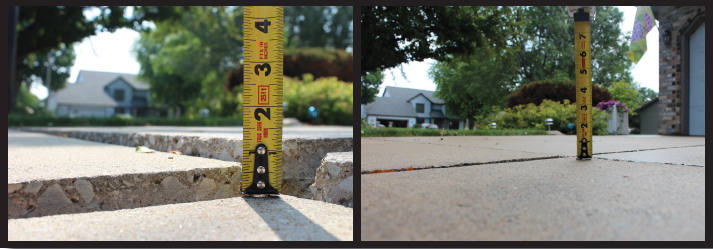How do I know if I should raise or replace my sunken concrete driveway or sidewalk?
To answer this question about sunken concrete, you need to decide if the top surface still looks good and if the concrete is broken into multiple pieces. If the surface is still in good shape and there are not lots of cracks, raising the concrete will likely be the best option. You may want to consider replacing the concrete if the surface is damaged or if there are a lot of broken sections.
How do I fix my sunken concrete driveway or sidewalk?
You can either tear out and replace your concrete or lift it back to its original height or proper slope using a process called polyurethane slab jacking. There are many benefits to slab jacking with polyurethane foam as outlined below.
Is slab jacking with polyurethane foam the same as mudjacking?
No, they are not the same though either technique can be used to raise sunken concrete. In both cases, holes are drilled in the existing concrete. There will be more holes of a larger size with mudjacking. In slab jacking, lightweight polyurethane foam is injected through the holes to fill in and lift the concrete. In mudjacking, the mixture of clay, sand and sometimes cement is used and is much heavier and may cause further sinkage.
Why is polyurethane slab jacking a better choice than mudjacking?
Polyurethane slab jacking is a better choice for the following reasons: the lighter material (2 lbs vs. 100 lbs per cubic foot) means there is a much lower chance of the concrete sinking again, there are fewer injection holes and they are smaller (5/8” vs. 1 5/8”) and the cure time is 15 minutes so down time is minimal.
Will my concrete look new after being raised with polyurethane slab jacking?
Though the surface itself will not look much different, having a levelled surface with reduced visibility of cracks will be a great improvement in the esthetic appeal of the concrete. Once your concrete is raised, the tripping hazard will have been removed and the risk of water pooling in the wrong places close to the foundation will also be mitigated.
Is raising my concrete with polyurethane foam expensive?
It is usually about half the cost of tearing out and replacing the concrete.
Will my concrete sink again after being raised with polyurethane foam?
Unlike mudjacking, where the material is quite heavy (100 lbs per cubic foot), polyurethane foam is much lighter (2lbs per cubic foot) so it is unlikely to contribute to any further sinkage.
Is slab jacking with polyurethane foam just a temporary solution? How long will it last?
Using high quality polyurethane foam is a permanent solution. Poly Boss uses top quality HMI polyurethane foam. We recommend avoiding contractors that use lower quality foam.
Can I raise my sunken concrete myself as a DIY project?
While this may be possible, it is not recommended. Without proper training, it is possible to use too much foam or to put it in the wrong places. This may result in an over-raised slab or improperly sloped slab which will then need to be torn out and completely replaced. As there are hundreds if not more than a thousand different types of polyurethane foam available, you need to make sure that the proper foam is used.
What will happen if rain or standing water comes into contact with the polyurethane foam?
Because of high density polyurethane characteristics, this foam-like material is resistant to water penetration. In fact, specially designed High Density Polyurethane is Hydrophobic and can even be used in under water or wet applications and have the same chemical reaction.
Is polyurethane foam safe?
We use HMI foams and they do not use toxic chemicals. Major toxic chemicals, often associated with some types of polyurethanes, such as some blowing agents, formaldehyde, benzene and toluene are NOT used in HMI foams. Most of what is warned against on the Internet pertains to these chemicals. HMI’s Dual Component Polyurethane Foam and its’ separate component parts are inert.
What will happen if I don’t lift my concrete?
Other than the undesirable esthetic look of sagging concrete, homeowners have a responsibility to make sure that they are providing a safe sidewalk for other people when they visit your home. If the problem continues over time, other landscaping and foundations could be affected. Water flooding could occur in your basement if rain is not re-directed away from the foundation walls. Increased costs of fixing a major problem could be alleviated if sinking concrete is fixed early on.
Is polyurethane foam environmentally friendly?
HMI leads the market on being environmentally friendly, in fact, our dual component polyurethane foam is made from over 40% recycled materials, making it the “greenest” polyurethane foam on the market!!!
Did you have a question we didn’t cover here?
These are just an assortment of the most common questions we hear from homeowners, but not every situation is the same. If you have a question, would like more information or would like us to come by and possibly evaluate your options with you we’d ask you take a moment or two to visit our quote page.
Unlike us our quote page is up 24/7 and once you provide us your question and contact information we can follow up at a time that works for both of us. Or if you’d like to just call us, visit our Contact Us page. Talk to you soon!
